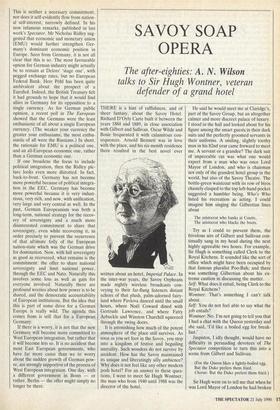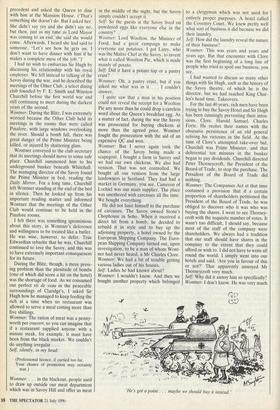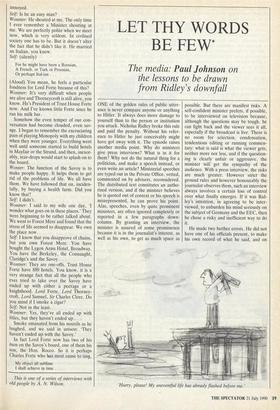SAVOY SOAP OPERA
The after-eighties: A. N. Wilson
talks to Sir Hugh Wontner, veteran defender of a grand hotel
THERE is a hint of raffishness, and of sheer fantasy, about the Savoy Hotel. Richard D'Oyly Carte built it between the years 1884 and 1889, in close association with Gilbert and Sullivan. Oscar Wilde and Bosie frequented it with calamitous con- sequences. Arnold Bennett was in love with the place, and his six-month residence there resulted in the best novel ever written about an hotel, Imperial Palace. In the inter-war years, the Savoy Orpheans made nightly wireless broadcasts con- veying to their far-flung listeners distant echoes of that plush, palm-adorned fairy- land where Pavlova danced until the small hours, where Noel Coward dined with Gertrude Lawrence, and where Fatty Arbuckle and Winston Churchill squeezed through the swing doors.
It is astonishing how much of the potent atmosphere of the place still survives. As soon as you set foot in the Savoy, you step into a kingdom of festive and beguiling unreality. Such wonders do not survive by accident. How has the Savoy maintained its unique and liberatingly silly ambience? Why does it not feel like any other modern posh hotel? For an answer to these ques- tions, I went to meet Sir Hugh Wontner, the man who from 1940 until 1988 was the director of the hotel. He said he would meet me at Claridge's, part of the Savoy Group, but an altogether calmer and more discreet palace of luxury. I stood in the hall and looked about for his figure among the smart guests in their dark suits and the perfectly groomed servants in their uniforms. A smiling, slightly toothy man in his 82nd year came forward to meet me. A servant or a grandee? The dark suit of impeccable cut was what one would expect from a man who was once Lord Mayor of London, and who is chairman not only of the grandest hotel group in the world, but also of the Savoy Theatre. The bottle-green waistcoat with its row of biros chastely clasped to the top left-hand pocket suggested a humbler being. Who's Who listed his recreation as acting. I could imagine him singing the Gilbertian lines about
The aristocrat who banks at Coutts, The aristocrat who blacks the boots.
Try as I could to prevent them, the frivolous airs of Gilbert and Sullivan con- tinually sang in my head during the next highly agreeable two hours. For example, Sir Hugh is something called Clerk to the Royal Kitchens. It sounded like the sort of office which might have been occupied by that famous pluralist Poo-Bah; and there was something Gilbertian about his ex- treme caution in discussing the matter. Self: What does it entail, being Clerk to the Royal Kitchens?
Wontner: That's something I can't talk about.
Self: You do not feel able to say what the job entails?
Wontner: No. I'm not going to tell you that I had a chat with the Queen yesterday and she said, 'I'd like a boiled egg for break- fast.'
Jaspistos, I idly thought, would have no difficulty in persuading devotees of The Spectator competition to turn this into a scene from Gilbert and Sullivan.
(For the Queen likes a lightly-boiled egg, But the Duke prefers them fried.
Chorus: But the Duke prefers them fried.)
Sir Hugh went on to tell me that when he was Lord Mayor of London he had broken precedent and asked the Queen to dine with him at the Mansion House. ('That's something she doesn't do. But I asked her.
She didn't say yes and she didn't say no. but then, just as my time as Lord Mayor
was coming to an end, she said she would come. Afterwards. I heard she had said to someone. "Let's see how he gets on. I don't want to have dinner with him if he makes a complete mess of the job.")' I had no wish to embarrass Sir Hugh by discussing his relationship with his royal
employer. We fell instead to talking of the Savoy during the war, and he described the meetings of the Other Club. a select dining club founded by F. E. Smith and Winston Churchill before the first world war and still continuing to meet during the darkest years of the second.
Wontner: During the Blitz, I was extremely worried because the Other Club held its
meetings in the rooms that were called Pinafore, with large windows overlooking the river. Should a bomb fall, there was great danger of the Prime Minister being killed, or injured by shattering glass.
Wontner conveyed to the club secretary that its meetings should move to some safe place. Churchill summoned him to his underground bunker beneath Whitehall. The managing director of the Savoy found the Prime Minister in bed, reading the Daily Mirror. For a long time, Churchill left Wontner standing at the end of the bed in silence, Then he looked up from his important reading matter and informed Wontner that the meetings of the Other Club would continue to be held in the Pinafore rooms.
I felt there was something ignominious about this story, in Wontner's deference and willingness to be treated like a butler. He was wise, however, to defer. True Edwardian sybarite that he was, Churchill continued to love the Savoy, and this was to have extremely important consequences for its future.
During the Blitz, though, a more press- ing problem than the plenitude of bombs (one of which did score a hit on the hotel) was the shortage of food. As we consumed our perfect ris de veau in the peaceable surroundings of Claridge's, I asked Sir Hugh how he managed to keep feeding the rich at a time when no restaurant was allowed to serve a meal costing more than five shillings.
Wontner: The ration of meat was a penny- worth per couvert, so you can imagine that if a restaurant supplied anyone with a minute steak, for example, it must have been from the black market. We couldn't do anything irregular . . .
Self, silently, in my head:
(Professional licence, if carried too far, Your chance of promotion may certainly mar.)
Wontner: . . . in the blackout, people used to draw up outside our meat department which was in Savoy Hill and offer us meat
in the middle of the night. but the Savoy simply couldn't accept it.
Self: So the guests at the Savoy lived on powdered eggs like everyone else in the country?
Wontner: Lord Wootton, the Minister of Food, had a great campaign to make everyone eat potatoes. I got Latry, who was the Maitre Chef at the Savoy, to invent what is called Woolton Pie, which is made mainly of potato.
Self: Did it have a potato top or a pastry crust?
Wontner: Oh, a pastry crust, but if you asked me what was in it . . . I couldn't answer.
I quite saw that a man in his position could not reveal the receipt for a Woolton Pie any more than he could drop a careless word about the Queen's breakfast egg. As a matter of fact, during the war the Savoy was prosecuted for buying chickens at more than the agreed price. Wontner fought the prosecution with the aid of an expensive QC and won.
Wontner: But I never again took the chance of the Savoy being made a scapegoat. I bought a farm in Surrey and we had our own chickens. We also had venison. That was not controlled. We bought all our venison from the large landowners in Scotland. They had had a market in Germany, you see. Cameron of Lochiel was our main supplier. The place was smothered with carcasses all the time. We bought everything.
He did not limit himself to the purchase of carcasses. The Savoy owned Stone's Chophouse in Soho. When it received a direct hit from a bomb, he decided to rebuild it in style and to buy up the adjoining property, a hotel owned by the European Shipping Company. The Euro- pean Shipping Company turned out, upon investigation, to be a man of whom Wont- ner had never heard, a Mr Charles Clore. Wontner.' We had a bit of trouble getting various ladies out of his houses.
Self: Ladies he had known about?
Wontner: I wouldn't know. And then we bought another property which belonged
to a clergyman which was not used for entirely proper purposes. A hotel called the Coventry Court. We knew pretty well what sort of business it did because we did their laundry.
Self: How did the laundry reveal the nature of their business?
Wontner: This was years and years and years ago. But that encounter with Clore was the first beginning of a long line of people who tried to spoil our business, you see.
I had wanted to discuss so many other things with Sir Hugh, such as the history of the Savoy theatre, of which he is the director, but we had reached King Char- les's head time. Takeovers.
For the last 40 years, rich men have been trying to buy the Savoy Hotel and Sir Hugh has been cunningly preventing their intru- sions. Clore. Harold Samuel. Charles Forte. He recites their names with the obsessive persistence of an old general reliving his victories in the field. At the time of Clore's attempted take-over bid, Churchill was Prime Minister, and that deferential ten minutes in the bunker began to pay dividends. Churchill directed Peter Thorneycroft, the President of the Board of Trade, to stop the purchase. The President of the Board of Trade did nothing.
Wontner: The Companies Act at that time contained a provision that if a certain proportion of shareholders petitioned the President of the Board of Trade, he was obliged to discover who it was who was buying the shares. I went to see Thorney- croft with the requisite number of votes. It wasn't too difficult, I should say, because most of the staff of the company were shareholders. We always had a tradition that our staff should have shares in the company to the extent that they could afford or wish to. I did not have to write all round the world. I simply went into our hotels and said, 'Are you in favour of this or not?' That apparently annoyed Mr Thorneycroft very much.
Self: Why did it annoy him so specifically? Wontner: I don't know. He was very much `He's got a point . . . maybe we should buy it instead.' annoyed.
Self: Is he an easy man?
Wontner: He shouted at me. The only time I ever remember a Minister shouting at me. We are perfectly polite when we meet now, which is very seldom. In civilised society one has to be. But it doesn't alter the fact that he didn't like it. He married an Italian, you know.
Self: (silently)
For he might have been a Roosian, A French, or Turk or Proosian, Or perhaps Ital-ian . . .
(Aloud) You mean, he feels a particular fondness for Lord Forte because of this? Wontner: It's very difficult when people are alive and Thorneycroft is still alive, you know. He's President of Trust House Forte now. And I've known little Forte since he ran his milk bar.
Somehow the even temper of our con- versation had become clouded, even sav- age. I began to remember the excruciating pain of playing Monopoly with my children when they were younger. Everything went well until someone started to build hotels in Mayfair or the Strand, and then, inexor- ably, tear-drops would start to splash on to the board.
Wonter: The function of the Savoy is to make people happy. It helps them to get rid of the problems of life. We all have them. We have followed that on, inciden- tally, by buying a health farm. Did you know that?
Self: I didn't.
Wontner: I said to my wife one day, wonder what goes on in these places.' They were beginning to be rather talked about. We went to Forest Mere and found that the stress of life seemed to disappear. We own the place now.
Self: I know that you disapprove of chains, but you own Forest Mere. You have bought the Lygon Arms Hotel, Broadway. You have the Berkeley, the Connaught, Claridge's and the Savoy . . .
Wontner: They are one-offs. Trust House Forte have 880 hotels. You know, it is a very strange fact that all the people who ever tried to take over the Savoy have ended up with either a peerage or a knighthood. Lord Forte, Lord Thorney- croft, Lord Samuel, Sir Charles Clore. Do you mind if I smoke a cigar?
Self: Not in the least.
Wontner: Yes, they've all ended up with titles, but they haven't ended up . . .
Smoke emanated from his nostrils as he laughed, and we said in unison: 'They haven't ended up with the Savoy.'
In fact Lord Forte now has two of his men on the Savoy's board, one of them his son, the Hon. Rocco. So it is perhaps Charles Forte who has most cause to sing,
My object all sublime I shall achieve in time . . .
This is one of a series of interviews with old people by A. N. Wilson.




















































 Previous page
Previous page